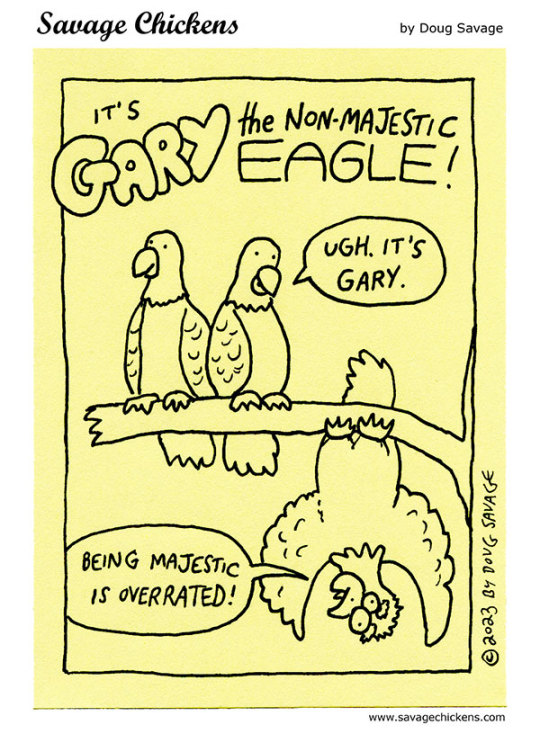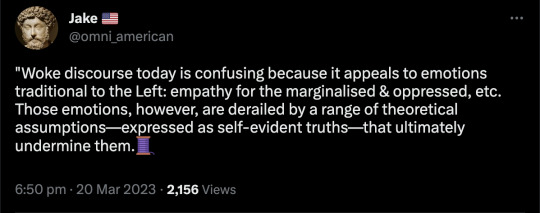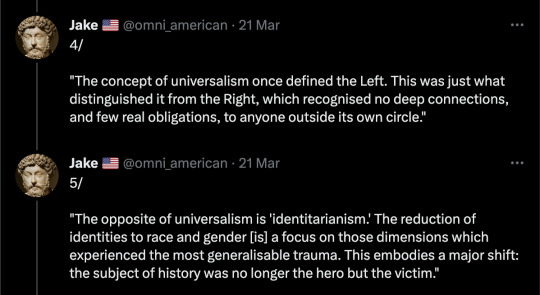#snobbery
Explore tagged Tumblr posts
Text
I love how Ishmael keeps complaining about having to be in a crowd of those uncouth, uneducated, shabby, superstitious sailors.
Dude, seriously.
#moby dick#herman melville#obsession#literature#classic literature#book characters#ishmael#whale weekly#face palm#snobbery
64 notes
·
View notes
Text
The doorbell rang. Lady Milton ignored it. One never opened one's own front door.
Kate Atkinson, from Death at the Sign of the Rook
#snobby#snobbery#class system#humor#aristocracy#privileged#quotes#lit#words#excerpts#quote#literature#spoiled#kate atkinson#death at the sign of the rook
7 notes
·
View notes
Text
I have a theory.
The Right thinks that DEI/affirmative action/etc. elevates mediocrity because of the dismal quality of their own tokens.
Look no further than the fashion designers, musicians, filmmakers, actors, drag performers, and other, ahem, "creative" types who went MAGA for proof, especially the queer and/or non-white among them. They're tiny-ass, undistinguished fish in ponds so small and undisturbed by talent that they're not even qualified to be tempests in teacups.
3 notes
·
View notes
Text

Ugh Not Gary Again.
Just felt like drawing Gary again!
32 notes
·
View notes
Text
youtube
Pretentious, moi?
My latest BookTube video is the Snob-O-Meter tag, where I answer a set of questions all about book snobbery: What it is, whether I've experienced or perpetrated it, and ultimately, whether I am a book snob.
3 notes
·
View notes
Text
I don't know how many people here are members of Meetup groups or even run Meetup groups, but I run three of them, and my #1 policy with any group - no matter the theme - is to be welcoming to ANYBODY regardless of skin color, gender identity, romantic/sexual orientation, religion or anything like that. I just left one tonight because the group leader was being a snob. He claimed that something came up and ended up removing me and a friend of mine from attending because he had an "announcement" and needed his "regular members" to be present. I honestly don't know what he was thinking, but to me, that's no way to run a Meetup group.
#Meetup#Meetup groups#groups#snobs#snobbery#snobbishness#rant#rant post#Honestly most people can go fuck themselves
4 notes
·
View notes
Text
I've decided everyone with interests that are considered snobby (i.e literature, art history, etc) gets to stop worrying about sounding like a snob when talking about it
#fascination of the arts should never be restricted to those wealthy enough to have financed them thousands of years ago#go and make and understand art with your own hands and understand it with your own cells#sounds of a jesse#snobbery#art history#literature#classic lit
4 notes
·
View notes
Text
POND POLITICS: watch this duck get snubbed by all the ducks on the shore. Nature can be brutal, y’all
3 notes
·
View notes
Text
"In Princeton, snobbery works in reverse. It is considered vulgar, for example, to refer to a man as 'professor' or 'doctor,' since one would suppose that his probably one or the other, anyway, if not both. Distinction of a sort can thus be gained by not going to college at all.
--Charles Price, Saturday Evening Post, November 16, 1957
#Princeton#1950s#snobbery#status#town of Princeton#PrincetonU#Princeton University#quote#Princetonquote#On This Day
3 notes
·
View notes
Text





By: Susan Neiman
Published: Mar 18, 2023
It is 85 years since the great bluesman Lead Belly coined the phrase “stay woke” in “Scottsboro Boys”, a song dedicated to nine black teenagers whose execution for rapes they never committed was only prevented by years of international protests and the American Communist Party. Staying alive to injustice — what could be wrong with that? Apparently, quite a lot. In a few short decades, woke was transformed from a term of praise to a term of abuse. Still, the fact that politicians ranging from Ron DeSantis to Rishi Sunak deploy “woke” as a battle cry should not prevent us from examining its assumptions. For not only liberals, but many Leftists and socialists like me are increasingly uneasy with the form it has taken.
The woke discourse today is confusing because it appeals to emotions traditional to the Left: empathy for the marginalised, indignation at the plight of the oppressed, determination that historical wrongs can be righted. Those emotions, however, are derailed by a range of theoretical assumptions — usually expressed as self-evident truths — that ultimately undermine them.
Take a sentence the New York Times printed shortly after Biden’s election: “Despite Vice President Kamala D. Harris’s Indian roots, the Biden administration may prove less forgiving over Modi’s Hindu nationalist agenda.” If you read that quickly, you may miss the theoretical assumption: political views are determined by ethnic backgrounds. If you know nothing about contemporary India, you may miss the fact that the fiercest critics of Modi’s violent nationalism are themselves Indian.
Now, the New York Times is neither unique nor particularly leftist, but it does set standards for progressive discourse in more than one country. What concerns me most here are the ways in which contemporary voices considered to be progressive have abandoned the philosophical ideas that are central to any liberal or Left-wing standpoint: a commitment to universalism over tribalism, a firm distinction between justice and power, and a belief in the possibility of progress. All these ideas are connected. The Right may be more dangerous, but today’s Left has deprived itself of ideas we need if we hope to resist the lurch to the Right.
This Rightwards lurch is international and organised. The solidarity between them suggests that nationalist beliefs are only marginally based on the idea that Hungarians/Norwegians/Jews/Germans/Anglo-Saxons/Hindus are the best of all possible tribes. What unites them is the principle of tribalism itself: you will only truly connect with those who belong to your tribe, and you need have no deep commitments to anyone else.
It’s a bitter piece of irony that today’s Right-wing tribalists today find it easier to make common cause than those on the Left whose commitments traditionally stemmed from universalism, whether they recognise it or not. Woke discourse is confusing because so many of its goals are indeed shared by progressives everywhere. The idea of intersectionality might have emphasised the ways in which all of us have more than one identity. Instead, it led to a focus on those parts of identities which are most marginalised, and multiplied them into a forest of trauma.
Wokeness emphasises the ways in which particular groups have been denied justice, and seeks to rectify and repair the damage. But in the focus on inequalities of power, the concept of justice is often left by the wayside. Wokeness demands that nations and peoples face up to their criminal histories. But in the process, it often concludes that all history is criminal.
The concept of universalism once defined the Left; international solidarity was its watchword. This was just what distinguished it from the Right, which recognised no deep connections, and few real obligations, to anyone outside its own circle. The Left demanded that the circle encompass the globe. This was what standing Left meant: to care about striking coal miners in Wales, or Republican volunteers in Spain, or freedom fighters in South Africa. What united was not blood but conviction — first and foremost the conviction that behind all the differences of time and space which separate us, human beings are deeply connected in a wealth of ways. To say that histories and geographies affect us is trivial. To say they determine us is false.
The opposite of universalism is often called “identitarianism”, but the word is misleading, for it suggests that our identities can be reduced to, at most, two dimensions. In fact, all of us have many. As Kwame Anthony Appiah reminds us: “Until the middle of the 20th century, no one who was asked about a person’s identity would have mentioned race, sex, class, nationality, region or religion.”
The reduction of the multiple identities we all possess to race and gender isn’t about physical appearance. It’s a focus on those dimensions which experienced the most generalisable trauma. This embodies a major shift that began in the mid-20th century: the subject of history was no longer the hero but the victim. The impulse to shift our focus to the victims of history began as an act of justice. History was told by the victors, while the victims’ voices went unheard. To turn the tables and insist that the victims’ stories enter the narrative was just a part of righting old wrongs. The movement to recognise the victims of slaughter and slavery began with the best of intentions. It recognised that might and right often fail to coincide, that very bad things happen to all sorts of people, and that even when we cannot change that we are bound to record it. Yet something went wrong when we rewrote the place of the victim; the impulse that began in generosity turned downright perverse.
The limiting case of this trend is the story of Binjamin Wilkomirski, the Swiss man whose claims to have spent his childhood in a concentration camp turned out to be invented. Wilkomirski was hardly alone. In the two decades since, there has been a rash of contemporaries inventing worse histories than they experienced — a trend which runs counter to some of the heroes of postcolonial thinking, such as Frantz Fanon, whose Black Skin, White Masks proclaims: “I am not the slave of the Slavery that dehumanised my ancestors.”
Identity politics not only contract the multiple components of our identities to one: they essentialise that component over which we have the least control. I prefer the word “tribalism”, an idea which is as old as the Hebrew Bible. Tribalism is a description of the civil breakdown that occurs when people, of whatever kind, see the fundamental human difference as that between our kind and everyone else.
Universalism is now under fire on the Left because it is conflated with fake universalism: the attempt to impose certain cultures on others in the name of an abstract humanity that turns out to reflect just a dominant culture’s time, place, and interests. This happens daily in the name of corporate globalism. But let’s consider what a feat it was to make that original abstraction to humanity. Earlier assumptions were inherently particular, as earlier ideas of law were religious. The idea that one law should apply to Protestants and Catholics, Jews and Muslims, lords and peasants, simply in virtue of their common humanity is a relatively recent achievement which now shapes our assumptions so thoroughly we fail to recognise it as an achievement at all.
Let’s also consider the opposite: the Nazi legal theorist Carl Schmitt, who wrote that “whoever says the word ‘humanity’ wants to deceive you”. Instead we might say: “whoever says ‘humanity’ is making a normative claim.” To recognise someone as human is to acknowledge a dignity in them that should be honoured. It also implies that this recognition is an achievement: to see humanity in all the weird and beautiful ways it appears is a feat that demands you go beyond appearances.
Which do you find more essential: the accidents we are born with, or the principles we consider and uphold? Traditionally, it was the Right who focused on the first, and the Left who emphasised the second. This tradition has been inverted. It’s not surprising, then, that theories held by the woke undermine their empathetic emotions and emancipatory intentions. Those theories not only have strong reactionary roots; some of their authors were outright Nazis. Ideas influenced by Carl Schmitt and Martin Heidegger and their epigones take up plenty of room on the progressive syllabus. The fact that both men not only served the Nazis but defended doing so long after the war is old news. Outrage, today, is reserved for racist passages of 18th-century philosophy.
In fact, many of the theoretical assumptions which support the most admirable impulses of the woke come from the intellectual movement they most despise. The best tenets of woke, such as the insistence on viewing the world from more than one geographical perspective, come straight from the Enlightenment. Contemporary rejections of this period usually go hand in hand with not much knowledge of it. But you can’t hope to make progress by sawing at the branch you don’t know you are sitting on.
It is now an article of faith that universalism, like other Enlightenment ideas, is a sham that was designed to disguise Eurocentric views which supported colonialism. These claims are not simply ungrounded: they turn the Enlightenment upside down. Enlightenment thinkers invented the critique of Eurocentrism and were the first to attack colonialism — on the basis of universalist ideas. When contemporary postcolonial theorists rightly insist that we learn to view the world from the perspective of non-Europeans, they are echoing a tradition that goes back to 18th-century thinkers, who risked their livelihoods, and sometimes their lives, to defend those ideas.
This is not merely a historical matter: we need Enlightenment ideas if we have any hope of moving forward against what are politely called the authoritarian tendencies of the present. But there is no time for politeness when many elected leaders around the world are openly undermining democracy.
My book Left is not Woke sketches the theoretical underpinnings of much woke discourse, and argues for a return to those Enlightenment ideas which are crucial for any progressive standpoint: the commitment to universalism over tribalism, the belief in a principled distinction between justice and power, and the conviction that progress, while never inevitable, is possible. Such ideas are anathema to thinkers such as Michel Foucault, the most-cited philosopher in postcolonial studies, or Carl Schmitt.
Both rejected the idea of universal humanity and the distinction between power and justice, along with a deep scepticism towards any idea of progress. What makes them interesting to progressive thinkers today is their commitment to unmasking liberal hypocrisies. Schmitt was particularly scorching about British imperialism, and American commitment to the Monroe Doctrine; both, he argued, used pieties about humanity and civilisation to disguise naked piracy.
But Land and Sea, his book expanding these views, was published when Germany was at war with Britain and America. It’s an old Nazi trope. Schmitt wasn’t wrong that universalist claims of justice meant to restrain simple assertions of power have been abused for centuries. He concluded that unvarnished power grabs like those of the Nazis were not only legal but legitimate. You may think that’s the best we can do. Or you may go to work to narrow the gap between ideals of justice and realities of power.
As for Michel Foucault, his style was transgressive, but his vision was gloomier than any traditional conservative. You think we make progress towards practices that are kinder, more liberating, more respectful of human dignity — all goals of the Left? Look at the history of an institution or two. What seemed to be steps towards progress turn out to be more sinister forms of repression. All of them are ways in which the state extends its domination over our lives. Once you’ve seen how every step forward becomes a more subtle and powerful step towards total subjection, you’re likely to conclude that progress is illusory.
Woke activists fail to see that both these theories subvert their own goals. Without universalism there is no argument against racism, merely a bunch of tribes jockeying for power. Any by the fall of 2020 few voices defending Black Lives Matter, of whom I was initially one, were universalist. If that’s what political history comes to, there is no way to maintain a robust idea of justice, let alone coherently strive for progress.
Enlightenment thinkers, meanwhile, proclaimed that progress is (just barely) possible; their passionate engagement with the evils of their day precludes any belief that progress is assured. Still, they never stopped working towards it. As Kant argued, we cannot act morally without hope. To be clear: hope is not optimism. Hope makes no forecasts at all. Optimism is a refusal to face facts. Hope aims to change them. When the world is really in peril, optimism is obscene. Yet one thing can be predicted with absolute certainty: if we succumb to the seduction of pessimism, the world as we know it is lost.
You need not study philosophical debates about the relations between theory and practice to know at least this: what you think is possible determines the framework in which you act. If you think it’s impossible to distinguish truth from narrative, you won’t bother to try. If you think it’s impossible to act on anything other than self-interest, whether genetic, individual or tribal, you will have no qualms about doing the same.
It is often recalled that the Nazis came to power through democratic elections, but they never won a majority until they had already grasped power. Had the Left-wing parties been willing to form a united front, as thinkers from Einstein to Trotsky urged, the world could have been spared its worst war. The differences dividing the parties were real; blood had even been spilled. But though the Stalinist Communist Party couldn’t see it, those differences paled next to the difference between universal Leftist movements and the tribal visions of fascism.
We cannot afford a similar mistake.
==
left wing | ˌlef(t) ˈwiNG | noun (the left wing) 1 the section of a political party or system that advocates for greater social and economic equality, and typically favors socially liberal ideas; the liberal or progressive group or section.
When you're more left than the Left, but they call you the Right.
-
Many activists on the identitarian left, in other words, share far more ideological common ground with the far right than they would care to admit. Both factions repudiate John Stuart Mill’s principle that ‘the individual is sovereign’ in favour of group identity; both are openly hostile to free speech and, irrespective of intentions, both are responsible for creating the conditions within which the far right can flourish. That said, to refer to the Critical Social Justice movement as the ‘identitarian left’ would be to accept their claim to be in any meaningful sense ‘left wing’. The new puritans have eschewed the traditional socialist goals of redressing economic inequality and redistributing wealth and replaced them with an obsessive focus on race, gender and sexuality. These are deemed to be the source of all disparities in power, in spite of the obvious truth that privilege is most commonly determined by money, class, heredity and nepotism.
-- Andrew Doyle, "The New Puritans"
Woke beliefs of invisible power dynamics and postmodern social constructivist philosophy originate from, and are propagated by, some of the most privileged academic elites on the planet.
They have the time, the resources and the ennui to spend on luxury beliefs about numinous supernatural demons woven into the fabric of society and the pretentious French philosophy that claims to hunt down the demons and exorcise them with magic spells of discourse and redefining words. These are not the concerns of people who need to worry about keeping food on the table and affording medicines this month.
They've completely abandoned their traditional constituency - the working class, those who don't have degrees in shallow luxury beliefs, those who have pragmatic concerns rather than academic hypotheticals and $10-word snobbery.
#Susan Neiman#omni american#woke#wokeness as religion#cult of woke#wokeness#wokeism#left wing#snobbery#religion is a mental illness
23 notes
·
View notes
Text
Yes “Stay up for one more chapter/episode/pattern repeat” is a devil talking, but it’s a small devil of poor personal decisions. And it’s only a devil at all because another, louder devil is yelling that everyone who doesn’t get up heinously early and be Productive is somehow flawed and less worthy as a human being.
#the louder devil has many names#protestant work ethic#capitalism#hustle culture#ableism#snobbery#boomer parenting
5 notes
·
View notes
Text

[Lord, lord, the snobbery of the English!]
#s30e06 triple d nation - beef dishes#guy fieri#guyfieri#diners drive-ins and dives#lord#snobbery#english
3 notes
·
View notes
Text
'Money isn't the only indicator of success. It's a man's breeding that counts. The goodness that runs in his veins. Money can't buy that.'
Susie Yang, from White Ivy
#good breeding#blue bloods#money#wealthy#success#snobbery#quotes#lit#words#excerpts#quote#literature#susie yang#white ivy
2 notes
·
View notes
Text
All my life, people have taken my shyness for sullenness, snobbery, bad temper of one sort or another.
Donna Tartt
2 notes
·
View notes
Text
The road that led to Treegap had been trod out long before by a herd of cows who were, to say the least, relaxed. It wandered along in curves and easy angles, swayed off and up in a pleasant tangent to the top of a small hill, ambled down again between fringes of bee-hung clover, and then cut sidewise across a meadow. Here its edges blurred. It widened and seemed to pause, suggesting tranquil bovine picnics: slow chewing and thoughtful contemplation of the infinite. And then it went on again and came at last to the wood. But on reaching the shadows of the first trees, it veered sharply, swung out in a wide arc as if, for the first time, it had reason to think where it was going, and passed around.
On the other side of the wood, the sense of easiness dissolved. The road no longer belonged to the cows. It became, instead, and rather abruptly, the property of people. And all at once the sun was uncomfortably hot, the dust oppressive, and the meager grass along its edges somewhat ragged and forlorn. On the left stood the first house, a square and solid cottage with a touch-me-not appearance, surrounded by grass cut painfully to the quick and enclosed by a capable iron fence some four feet high which clearly said, “Move on – we don't want you here.” So the road went humbly by and made its way, past cottages more and more frequent but less and less forbidding, into the village. But the villages doesn't matter, except for the jailhouse and the gallows. The first house only is important; the first house, the road, and the wood.
There was something strange about the wood. If the look of the first house suggested that you'd better pass it by, so did the look of the wood, but for quite a different reason. The house was so proud of itself that you wanted to make a lot of noise as you passed, and maybe even throw a rock or two. But the wood had a sleeping, otherworld appearance that made you want to speak in whispers. This, at least, is what the cows must have thought: “Let us keep its peace; we won't disturb it.”
— Tuck Everlasting (Natalie Babbitt)
#book quotes#fantasy fiction#children's fiction#natalie babbitt#tuck everlasting#roads#woods#forest#travel#respectability#arrogance#snobbery#houses#magic#strangeness
3 notes
·
View notes
